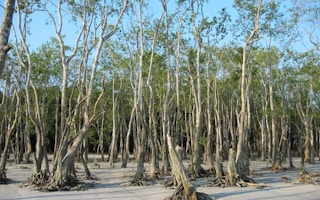Thousands of protesters set off on about 200 km march from capital Dhaka on Tuesday morning to Sundarbans to protest against the 1.5 billion U.S. dollar power plant near the world’s largest mangrove forests which straddle both Bangladesh and India.
The five-day long march, which started in Dhaka’s National Press Club, is being led by an environment protection group — National Committee on Protection of Oil, Gas, Mineral Resources, Power and Ports.
In a march before rally, leaders of the group say the proposed 1320-megawatt plant, to be built in the area of Rampal in Bangladesh’s Bagerhat district, some 178 km southwest of Dhaka, is too close to famous Sundarbans forests.
According to the protesters, discharge from the plant like fly ash and sulphur dioxide will have disastrous consequences for the fauna and flora of the mangrove forests — a UNESCO World Heritage site.
The protesters say the plant is not merely dangerous for the Sundarbans’ ecology but it also poses threat to local livelihoods.
They demanded the Rampal Thermal Power Plant project in Bagerhat, just 14 km away from the Sundarbans, be shelved forever.
Amid severe criticism from many power experts and green activists, Bangladesh Power Development Board (PDB) and Indian National Thermal Power Corporation (NTPC) in April this year signed three major deals heading towards implementation of plant.
Under the deals, the Bangladesh-India Friendship Power Company, a joint venture between the PDB and the NTPC with 50:50 shares, will implement the project in which officials claim that super critical technology would be used to curb the much talked about carbon emission.
The plant was initially put into motion in a bilateral agreement between Dhaka and Delhi during the Bangladeshi Prime Minister Sheikh Hasina’s tour of India in 2011 reportedly without proper environmental impact assessment.
The government later released an environmental impact assessment on the power plant but it was rejected by the environmentalists who argued that the report did not take into consideration most of the important environmental aspects of the Sundarbans, its ecology, flora and fauna as well as a large number of local people.
“Rampal Power Plant project must be stopped at any cost,” Anu Muhammad, member secretary of the committee, told the rally at National Press Club.
He said, “Don’t think that we’re opposing the plant because it’ s an Indian company. If it would be a company from Russia or USA. or China we would surely protest against the power plant.”
He, however, urged the government to not obstruct their peaceful march and rallies on way to Sundarbans.
With banners and placards, hundreds of leaders and activists of various leftist parties in Bangladesh also joined the march before rally of about 2,000 people in Dhaka to express their solidarity.
From the rally, speakers urged citizens of both India and Bangladesh to carry out concentrated efforts to stop the power plant.
The group leaders say more people will join the march when it passes through many Bangladesh district towns and cities before reaching Rampal.










